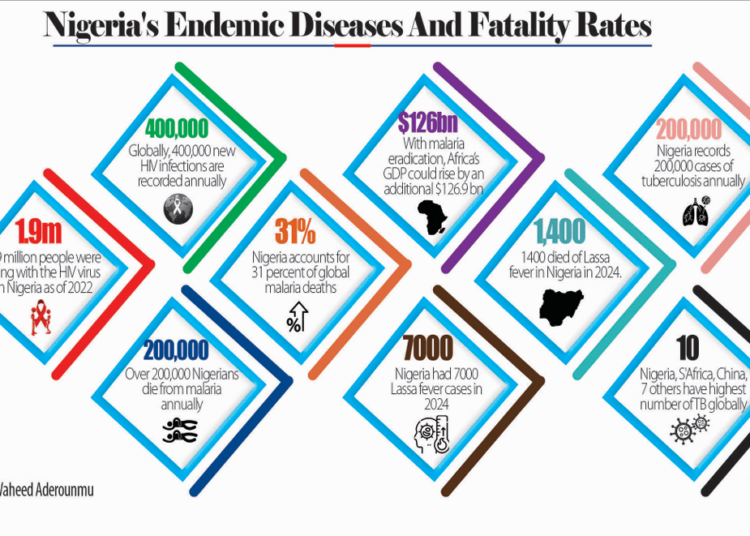Nigeria is still far from winning the fight against some killer diseases, which have become endemic.
Investigation conducted by LEADERSHIP Weekend showed that the country is still under the devastating burden of malaria, HIV/AIDS, Lassa fever, and tuberculosis (TB).
The data gathered during the investigation showed that the four prevalent diseases have continued to kill hundreds of thousands of the citizens on an annual basis.
Despite efforts to curb their spread, these diseases remain deeply entrenched due to systemic failures, environmental challenges, and gaps in healthcare infrastructure, experts have said.
Malaria has remained the deadliest disease in the country. Reports by international bodies such as the World Health Organisations (WHO) revealed that Nigeria accounts for 31 percent of global malaria deaths.
WHO estimates that over 200,000 Nigerians die from the disease annually.
It was further discovered that the situation was compounded by poor sanitation, stagnant water, and limited access to healthcare services despite the widespread availability of insecticide-treated nets and other preventive measures.
A report by Malaria No More UK highlights the potential economic benefits of malaria eradication, estimating that Africa’s Gross Domestic Product (GDP) could rise by an additional $126.9 billion if the United Nations (UN’s) target of reducing malaria by 90 percent by 2030 is achieved. This would generate nearly $16 billion annually, significantly boosting African economies.
Also, HIV/AIDS remains a major public health concern in Nigeria, with an estimated 1.9 million people living with the virus as of 2022. Stigma, misinformation, and inadequate healthcare access have contributed to about 400,000 new infections annually, with Nigeria reportedly recording close to 200,000 cases.
While Nigeria has the highest HIV burden in West and Central Africa, it heavily relies on international support, particularly the United States President’s Emergency Plan for AIDS Relief (PEPFAR), which covers nearly 90 percent of treatment costs.
Concerns however arose over a recent US executive order temporarily freezing foreign aid, which could have disrupted Nigeria’s HIV response. But a waiver granted on January 28, 2025, ensured continued funding for lifesaving antiretroviral (ARV) medications and medical services.
The director-general of the National Agency for the Control of AIDS (NACA), Dr. Temitope Ilori, reassured the public that treatment services would continue uninterrupted and urged the stakeholders to maintain their commitment to combating the epidemic.
LEADERSHIP Weekend also learnt that Lassa fever, another deadly disease, has remained a major public health threat.
The Nigeria Centre for Disease Control (NCDC) reported over 7,000 confirmed cases in 2024, with a fatality rate of approximately 20 percent. The disease, which is transmitted through contact with infected rodents or contaminated food, is most prevalent in Edo, Ondo, and Ebonyi states.
Experts say weak surveillance systems and inadequate rodent control efforts have contributed to the recurrence of Lassa fever outbreaks.
“We need to strengthen early detection mechanisms and improve community engagement to prevent outbreaks,” health officials warned.
Nigeria is also still battling with the tuberculosis (TB) scourge, with the country ranking among the top 10 globally in TB burden. Over 200,000 new cases are said to be recorded annually, with a high mortality rate due to delayed diagnosis and limited access to treatment.
South Africa and China are on top of the TB chart with Nigeria.
Stakeholders said overcrowded living conditions, poverty, and poor healthcare services have continued to drive the spread of TB.
While the government has introduced free TB testing and treatment programmes, the initiatives are often hampered by inadequate funding and logistical challenges.
Experts Proffer Solutions
As Nigeria continues its battle against these deadly diseases, health experts agree that stronger policies, increased funding, and greater public awareness are critical to reducing the country’s disease burden and preventing avoidable deaths.
For instance, the director-general of the Nigerian Medical Research Institute (NMRI), Professor John Oladapo Obafunwa, stressed the need for better public education and regulation of drug sales.
“People need to be discouraged from buying medications from street vendors and unlicensed chemists,” he said.
He also highlighted Nigeria’s heavy reliance on international donors for disease control efforts, noting that 95 percent of NMRI’s funding comes from organisations such as the WHO and the Bill & Melinda Gates Foundation.
“We need increased domestic funding to support research into pressing health challenges in Nigeria,” he stated.
A medical parasitologist at the College of Medicine, University of Lagos, Professor Wellington Oyibo, described Nigeria’s malaria mortality rate as the highest in the world.
“Over the past decade, more than 80,000 deaths have been recorded annually due to malaria,” he said.
Oyibo, however, expressed optimism at the introduction of malaria vaccines, saying they could significantly reduce fatalities.
“At least four out of 10 children will be protected from death, while six out of 10 will not suffer from severe forms of malaria,” he added.
To win the war against malaria, Oyibo called for increased private-sector involvement.
“Just as the private sector played a key role in combating COVID-19, they must support the malaria vaccine rollout. Our children need that support,” Oyibo said.
The chief executive officer (CEO) of the RBM Partnership to End Malaria, Dr. Michael Charles, called for more investment in malaria control efforts.
“Malaria is preventable and treatable, yet it continues to claim lives and hinder economic progress. The investment gap remains a major challenge, slowing down the rollout of effective tools and treatments,” he said.
On his part, the executive director of the Westfield Development Initiative, Omolola Lana, noted that poverty and environmental factors play a major role in the disease’s persistence.
“Many Nigerians live in areas with poor sanitation and stagnant water, creating ideal breeding grounds for mosquitoes,” she said.
She also pointed out that many people do not use long-lasting insecticidal nets (LLINs), despite their effectiveness.
“To address this challenge, we launched a project where we monitored recipients of LLINs to ensure they used them. Within six months, malaria cases dropped significantly in those communities,” Lana said.
She called for more awareness campaigns to promote the use of treated nets.
She also noted that the COVID-19 pandemic diverted resources from malaria programmes, slowing progress.
“Now that we have won the war against COVID-19, it is time to renew the fight against malaria,” she said.











